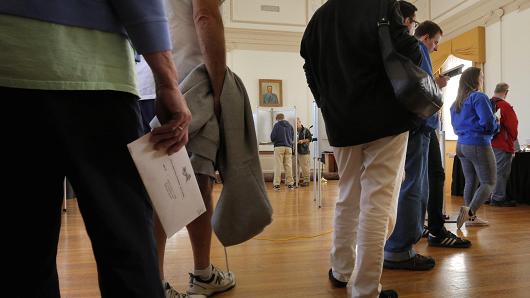As the election nears, thousands of people are signing up to “trade” their votes.
Here’s how it works: A Gary Johnson supporter in a swing state like Ohio can promise to vote for Hillary Clinton. In exchange, a Clinton supporter in a strong blue state like California would promise to vote for Johnson. Voila! Both get to make sure their votes count while staying true to their principles.
It’s not a new concept, but a number of online marketplaces are springing up to make it easier to swap votes. And the growing movement could make all the difference in a tight race.
Two of the biggest vote trading platforms that have sprung up during this election are #NeverTrump and TrumpTraders.org. As of Sunday evening, they said they’ve facilitated the trading of over 50,000 votes combined, and more than 12,000 in key swing states.
Silicon Valley entrepreneur Amit Kumar is the founder of #NeverTrump and says the response has been overwhelming. He says the pace of signups quickened over the weekend and people have been using the app in real time while in line during early voting. “People are coming here and finding strangers,” Kumar says. “From California to Florida. From Facebook to Instagram to Twitter, people can connect. It’s been crazy.”
John Stubbs is a lifelong Republican and a founder of R4C16.org, a group of Republicans for Clinton. He started TrumpTraders.org and says the number of “vote trades” for Clinton are growing in Colorado, New Hampshire and Nevada.
But vote trading is far from foolproof. The two people who promise to vote for each other’s candidate rely on the honor system. In some cases, as Kumar tells us, two voters have crossed state borders to meet each other face-to-face to feel more comfortable swapping votes. But there’s no way to hold someone to their word in the actual voting booth.
Vote trading is not without controversy either. Some critics have suggested it’s illegal. But in 2007, a court case found it’s protected by the First Amendment. “As long as people don’t trade favors or money,” Kumar said. “What you do in the polling booth is your freedom. Anyone trying to solicit votes for money is illegal.” Vote trading platforms like his simply connect voters and facilitate the conversation, he said. Meddlers are a different story, though, as Kumar says “tons of Trump voters” are trying to cause disruption within the app.
This method was first attempted during the close presidential race between Al Gore and George W. Bush in 2000. Sixteen years later, the internet is far more effective at spreading the word and facilitating trades. As Stubbs of TrumpTraders.org reminds us: The difference in Florida in 2000 was just 537 votes.
source”cnbc”





